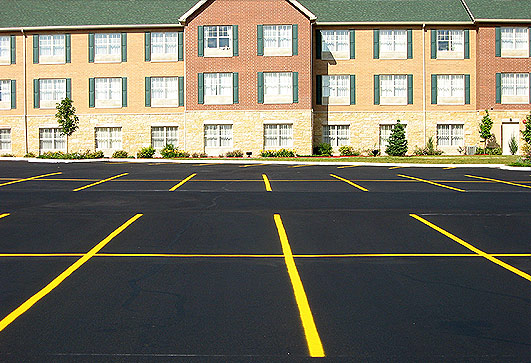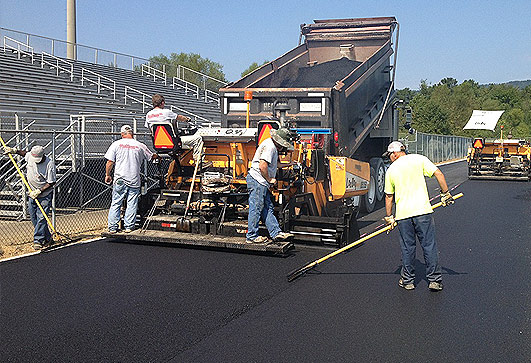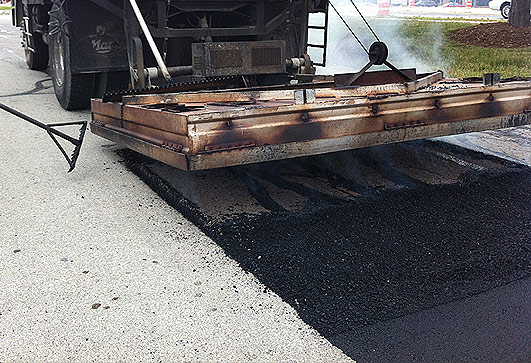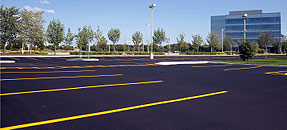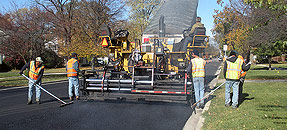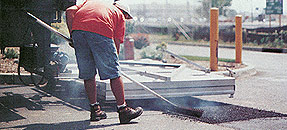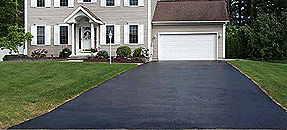Sealcoating is a very effective means of saving maintenance costs on asphalt and blacktop pavement that has begun to show signs of deterioration. The ideal time to seal a surface is when deterioration is first discovered; thus saving expensive patching and/or repaving. Sealcoating protects and maintains the life of your asphalt and should generally be done every 2-3 years depending on traffic conditions and weather. Image Pros of Rockford has skilled technicians and the latest spray and machine squeegee equipment to apply the proper coatings and revitalize your asphalt driveways, parking lots and parking areas. Our sealcoating systems include standard and special processes-each designed to meet your sealcoating needs.
Do you need asphalt seal coating? In 2008 the cost of new asphalt nearly doubled, meaning that it is now more important than ever to extend the life of asphalt paving through the various means available to us. Furthermore, the like-new appearance of your paving is more inviting to customers and improves traffic safety.
Image Pros offers asphalt sealcoating services for both residential as well as commercial properties. Our seal coating specialists use high performance products mixed to manufacturers specifications and applied in professional and workmanlike manner. Asphalt sealcoating projects can be completed during non-business hours to minimize any business disruptions, to avoid customer safety hazards and also to assure parking lot availability.
Sealcoating is a process through which one or more layers of a coal tar pitch or asphalt cement mix is applied to asphalt parking lots, asphalt driveways and other asphalt paving surfaces. Asphalt sealcoating provides a new, rich, black appearance to asphalt and provides a protective barrier against asphalt and blacktop damage caused by gasoline, oil, salt, water or ultraviolet rays. Sealcoating your blacktop or asphalt improves the exterior appearance of residential properties as well as to commercial business properties - while it increases the life of any asphalt and blacktop paving area.
Notification - all tenants that are going to be in the designated construction area are notified 48 hours prior to the commencement of the work.
Barricades - The parking lot is professionally barricaded using cones and barriers so that the areas under construction are clearly visible.
Pavement Cleaning - All pavement surfaces are cleaned thoroughly. Wire brooms and blowers are used to get all of the remaining debris off of the pavement surface to assure proper adhesion.
Oil Spot Treatment - Oil, grease, and gasoline stains are treated using an oil spot primer. This is important because sealer will not adhere properly to any of the above named stains. When the bonding agent is applied properly, the stains will be delayed from resurfacing thus extending the life of the sealcoat.
Application of Sealcoat - Image Pros will apply either one of our systems depending on the existing surface. Our first system is two coats that consist of a machine or hand squeegee coat followed by a spray coat. The second is a two-spray coat application over the entire area.
Curing Time - To assure the best quality job the proper curing time is essential. We require 24 hours of curing time from the time the first application is applied and at the end of the 24 hours the designated area will be unbarricaded and opened up for use.
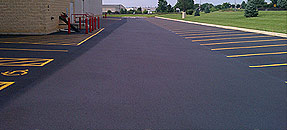
Image Pros also offers Parking Lot Striping and Pavement Marking services, including handicapped markings (including handicap signage), curb painting and other parking lot striping-related needs.
Parking Lot Striping Provides clearly marked parking stalls, Handicap parking Spaces, Directional Arrows, Enhanced traffic flow. We are fully equipped with the tools necessary to service these tasks up to state standard requirements. Our estimates are tailored to fit your specific needs.
Thermoplastic pavement marking is the most durable marking used in our area. The reason for it's durability is that it is applied at approximately ten times the thickness of paint markings. Thermo is a solid material that is heated to a temperature that allows it to flow. The highway stripers get their thermo in bags or blocks and melt it in huge pots. We use preformed thermoplastic that is heated with a special torch and flows and bonds with the pavement. Preformed thermo is great for small jobs in high traffic areas, but the cost is quite a bit higher than paint.
Parking lot striping is the "Icing on the cake" that not only makes your lot look great but also allows for the smooth and safe flow of traffic and helps you to be in compliance of ADA regulations.
We offer the following pavement marking and parking lot striping services:
- Re-Striping after sealcoating
- Re-Striping of faded lines
- New Lot Layout
- Stenciling
- No Parking
- Fire Lane
- Reserved
- Drive Thru
- Numbering
And whether the work is done on weekends, at night, or in segments, there are usually several ways that we can schedule and manage your asphalt sealcoating and/or pavement marking (striping) project to keep your business open. It is advised that we avoid traffic, water or other contaminants on a new seal coating project for a minimum of 18 to 36 hours. This allows for curing and proper setting of the materials used. We will work with you to create the best approach for your business.
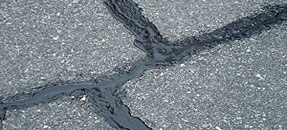 Our company is not only limited to Parking Lot Striping and Pavement
Marking. We also provide other asphalt maintenance services including
crackfilling, crack sealing
and crack repair.
Our company is not only limited to Parking Lot Striping and Pavement
Marking. We also provide other asphalt maintenance services including
crackfilling, crack sealing
and crack repair.
Crack sealing is the most important first step in maintaining an asphalt pavement, but it is often the most overlooked. All cracks in asphalt or concrete surfaces can rapidly turn into major hazards. Each year, many miles of cracks in asphalt pavements are left unsealed. This allows moisture to creep under the asphalt and pavement deterioration begins. When moisture enters a pavement crack, it slowly works its way down to erode the base. The pavement begins to sink and crumble, causing more cracks to form and creating pot holes.
This process is accelerated by freeze/thaw cycles of Midwest winters. Soon the area around the crack rapidly deteriorates and what could have been a small maintenance step has turned into a costly repair project. Crack sealing is a routine maintenance procedure that includes cleaning out the wide cracks and opening others so they are wide enough to accept sealant.
We use a hot rubberized crack sealant which remains flexible. The material is heated to approximately 400 degrees, poured into the crack and then a proper bond and surface smoothness. It will then cool and harden inside the crack, preventing moisture penetration. The flexibility of our sealant allows cracks to remain sealed in spite of the expansion and contraction of pavement throughout the year.

